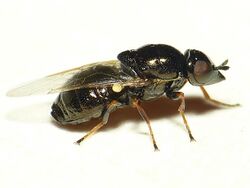Biology:Nemotelus nigrinus
| Nemotelus nigrinus | |
|---|---|

| |
| Nemotelus nigrinus, the "all-black snout" | |
| Scientific classification | |
| Domain: | Eukaryota |
| Kingdom: | Animalia |
| Phylum: | Arthropoda |
| Class: | Insecta |
| Order: | Diptera |
| Family: | Stratiomyidae |
| Genus: | Nemotelus |
| Subgenus: | Camptopelta |
| Species: | N. nigrinus
|
| Binomial name | |
| Nemotelus nigrinus Fallén, 1817[1]
| |
| Synonyms | |
Nemotelus nigrinus, the all-black snout, is a Holarctic species of soldier fly.[6][7][8]
Description
A small species (4.0 to 4.8.mm). Cubital vein (R 4+5) unforked. Body all black, without any pale pattern. Frons without any white spots. The distance from the base of the antennae to the tip of the rostellum is greater than the distance from the antennal base to the commencement of the narrow part of the frons. Median outgrowths of hypandrium and outgrowth of basal segment of gonopodites are absent. Aedeagus with two basal projections at a right angle to the plane of aedeagus [9][10][11]
Biology
The flight period is May to July. Habitats are fens and marshes, flower meadows and flower rich grassland.
Distribution
North and Central Europe, North and South USSR, Caucasus, Siberia, Central Asia, Mongolia, North America.
References
- ↑ Fallén, C.F. (1817). Tabani et Xylophagei Sveciae. Lundae [=Lund]: Berlingianis. pp. 14.
- ↑ Walker, F. (1849). List of the specimens of dipterous insects in the collection of the British Museum. Part III. London: British Museum (Natural History). pp. 485–687.
- ↑ 3.0 3.1 Loew, Hermann (1863). "Diptera Americae septentrionalis indigena. Centuria tertia". Berl. Entomol. Z. 7: 1–55. doi:10.1002/mmnd.18630070104. https://www.biodiversitylibrary.org/item/39616#page/9/mode/1up. Retrieved 14 February 2017.
- ↑ Loew, H. (1869). "Diptera Americae septentrionalis indigena. Centuria octava". Berliner Entomologische Zeitschrift 13: 1–52. https://www.biodiversitylibrary.org/page/8343745#page/19/mode/1up. Retrieved 15 July 2022.
- ↑ Loew, Hermann (1872). "Diptera Americae septentrionalis indigena. Centuria decima". Berliner Entomologische Zeitschrift 16: 49–124. doi:10.1002/mmnd.18720160110. https://www.biodiversitylibrary.org/page/42347765#page/61/mode/1up. Retrieved 25 July 2021.
- ↑ Woodley, N.E. (2001). "A World Catalog of the Stratiomyidae (Diptera)". Myia 11: 1–462. https://www.researchgate.net/publication/303225468. Retrieved 7 December 2022.
- ↑ Stubbs, Alan E; Drake, Martin (2014). British Soldierflies and their allies (an illustrated guide to their identification and ecology) (2 ed.). Reading: British Entomological and Natural History Society. pp. 528 pp, 20 plates. ISBN 9781899935079.
- ↑ Zeegers, T.; Schulten, A. (2022). Families of Flies with Three Pulvilli: Field Guide Northwest Europe. Graveland: Jeugdbondsuitgeverij. pp. 256pp. ISBN 9789051070682.
- ↑ Seguy. E. Faune de France Faune n° 13 1926. Diptères Brachycères. 308 p., 685 fig.
- ↑ George Henry Verrall Stratiomyidae and succeeding families of the Diptera Brachycera of Great Britain - British flies (1909) BHL Full text with illustrations
- ↑ E. P. Narchuk in Bei-Bienko, G. Ya, 1988 Keys to the insects of the European Part of the USSR Volume 5 (Diptera) Part 2 English edition. Keys to Palaearctic species but now needs revision.
Wikidata ☰ Q6991326 entry
 |

